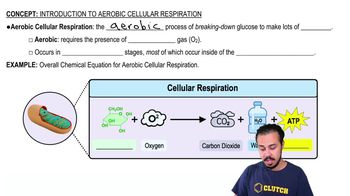Here are the essential concepts you must grasp in order to answer the question correctly.
Cellular Respiration
Cellular respiration is a metabolic process in which cells convert nutrients into energy, primarily in the form of ATP, while producing byproducts like carbon dioxide and water. This process often involves electron transport chains, where electrons are transferred through a series of proteins to generate energy. Understanding this concept is crucial because the production of magnetite by bacteria suggests they are engaging in a form of respiration that relies on electron transport.
Recommended video:
Introduction to Cellular Respiration
Electron Transport Chain
The electron transport chain (ETC) is a series of protein complexes located in the cell membrane that facilitate the transfer of electrons derived from nutrients. This process is essential for generating a proton gradient that drives ATP synthesis. The experiment's use of a drug that inhibits the ETC is significant because it directly tests the bacteria's ability to perform respiration, which is linked to magnetite production.
Recommended video:
Hypothesis Testing
Hypothesis testing is a scientific method used to determine the validity of a proposed explanation for a phenomenon. In this context, the researchers' hypothesis is that the bacteria perform cellular respiration to produce magnetite. The follow-up experiment's results, showing no magnetite production when the ETC is inhibited, provide critical evidence that can either support or undermine this hypothesis, depending on the interpretation of the data.
Recommended video:






